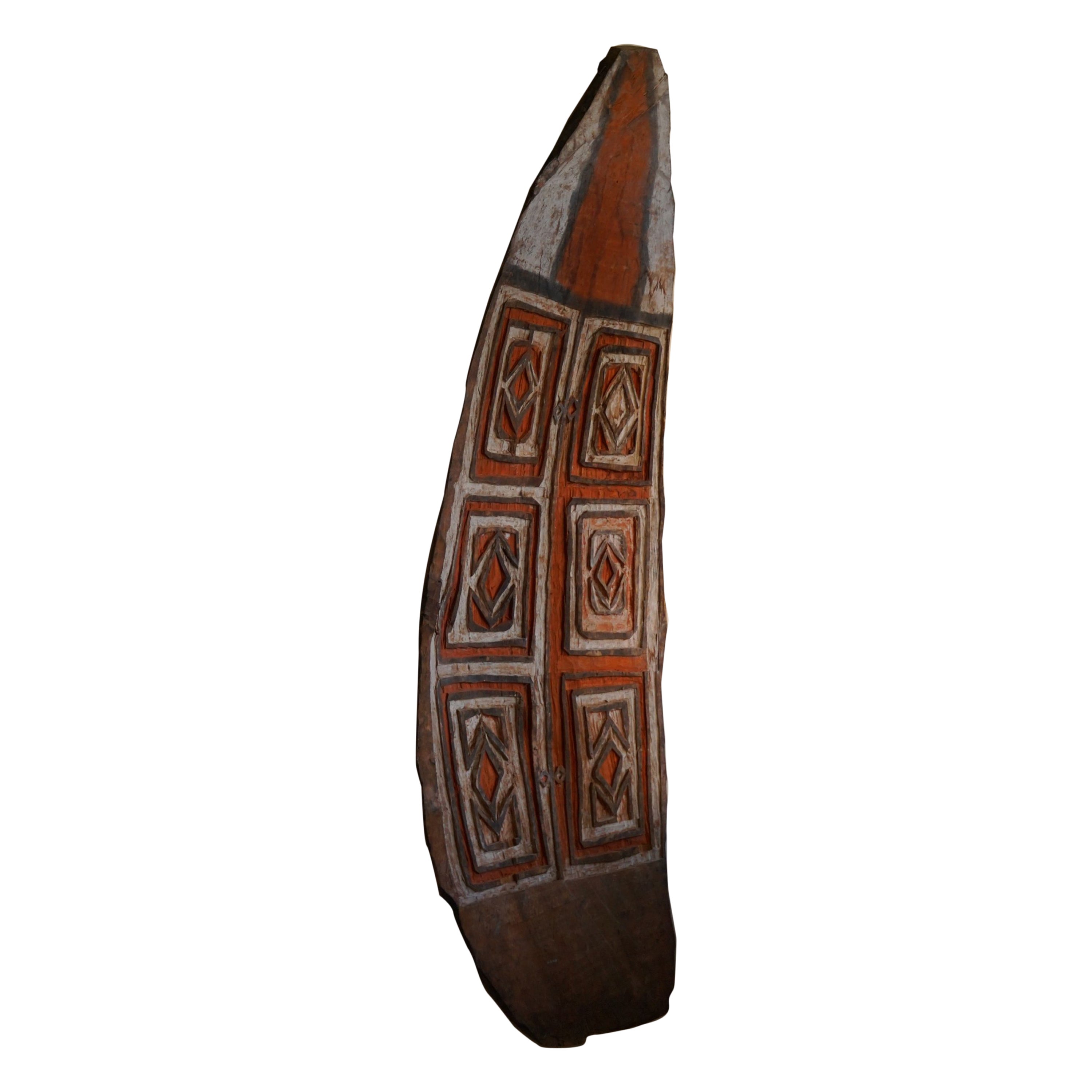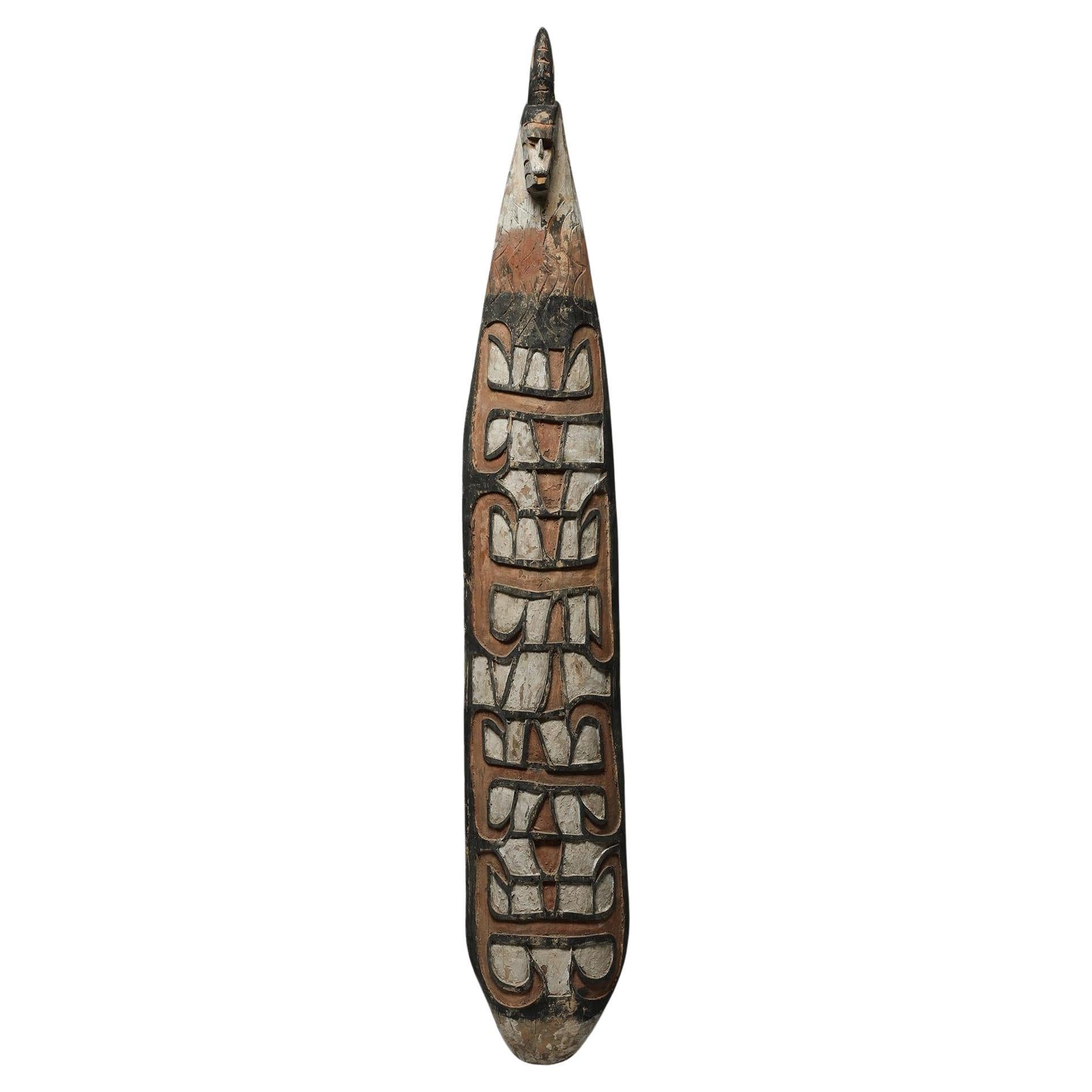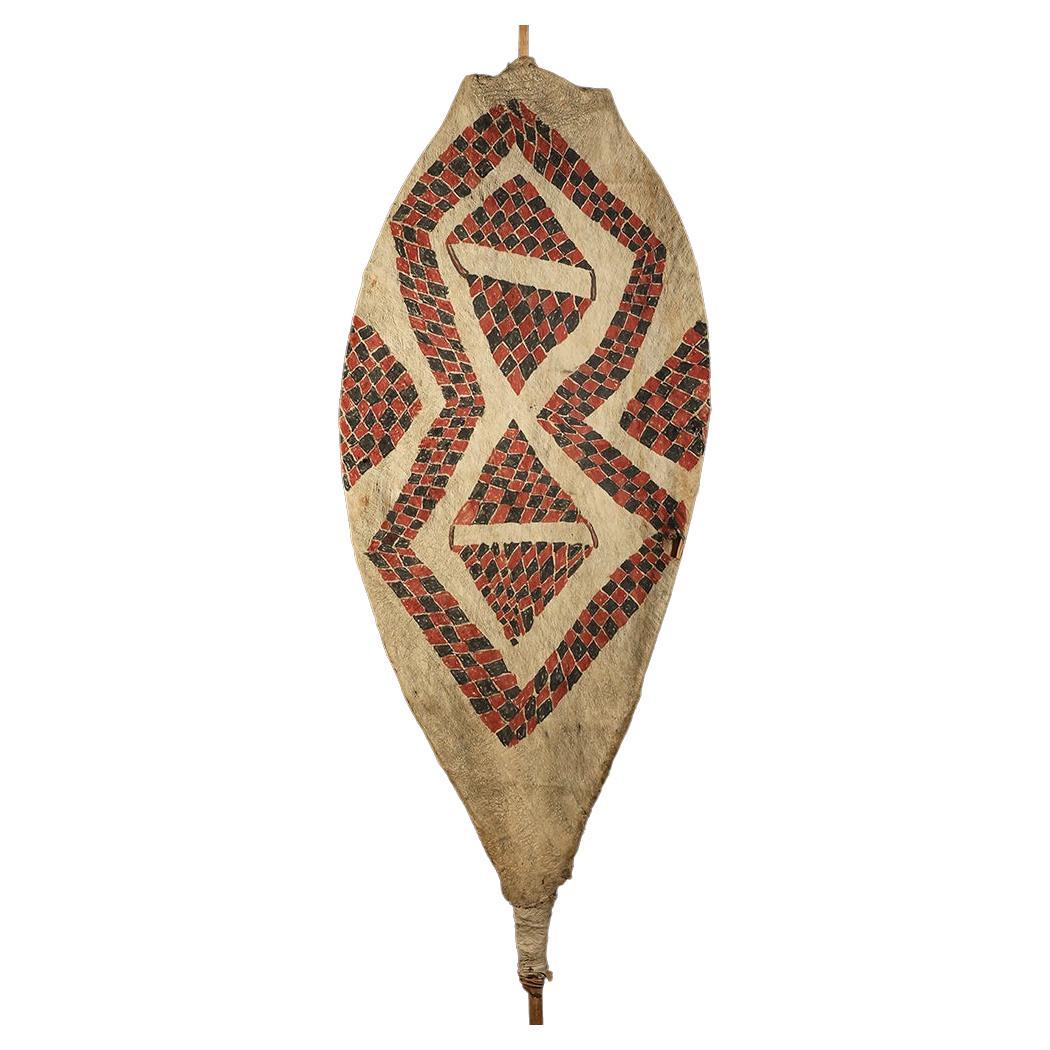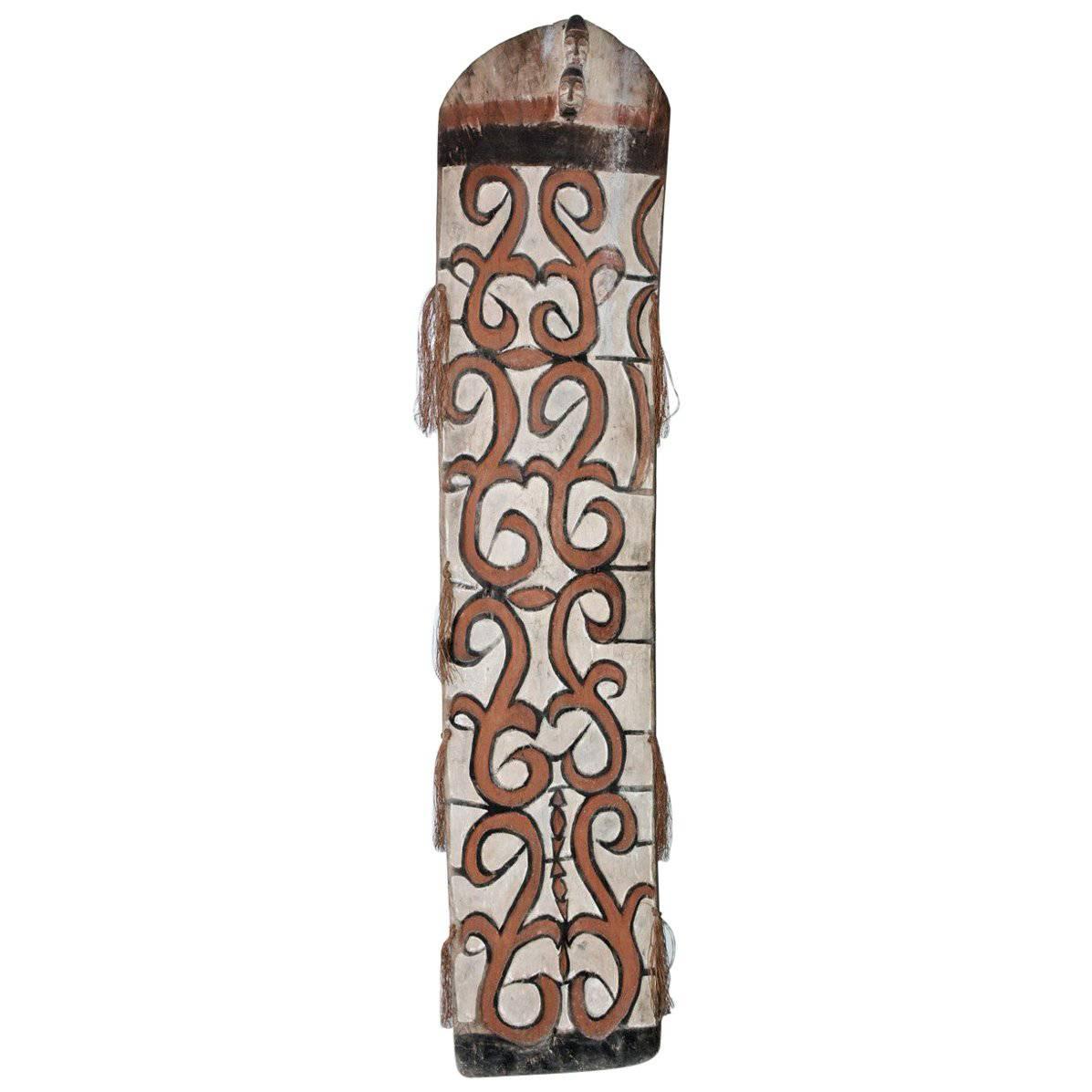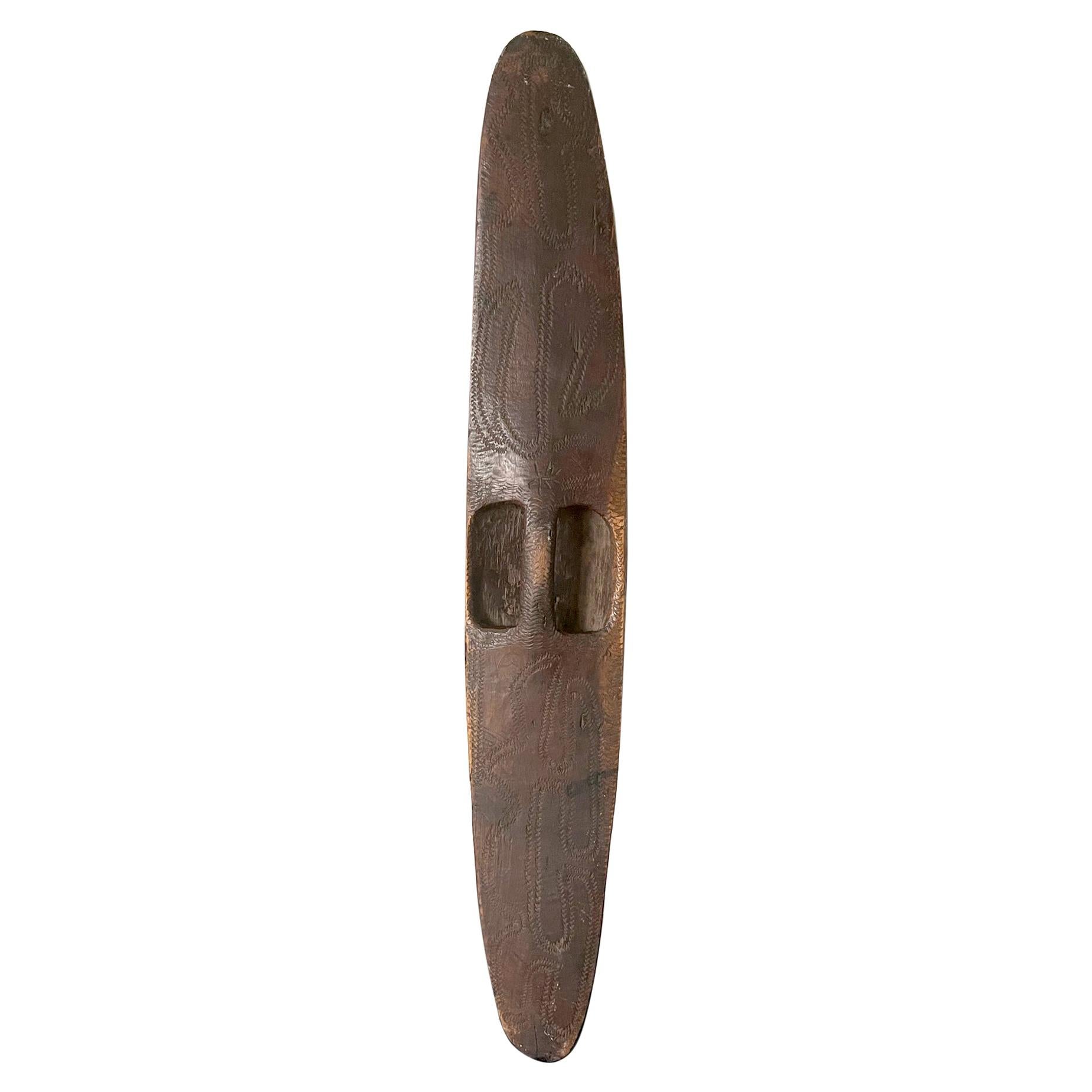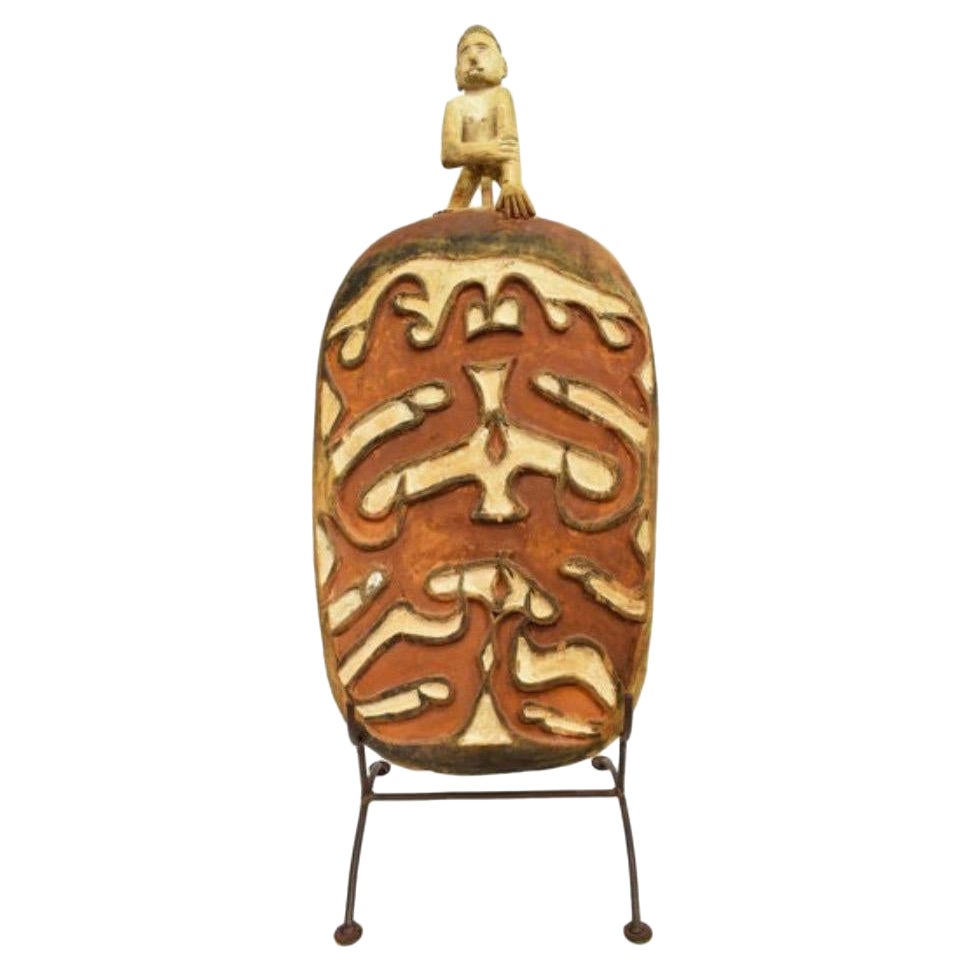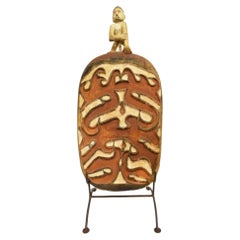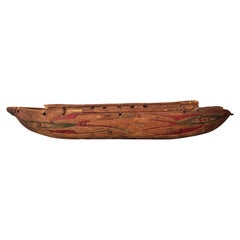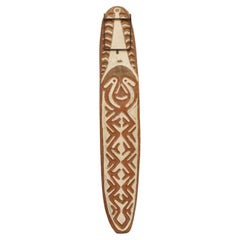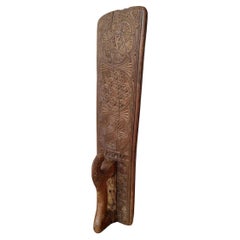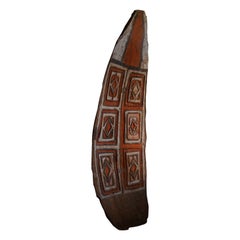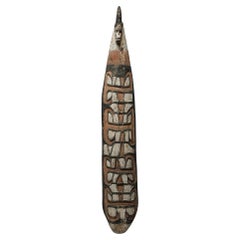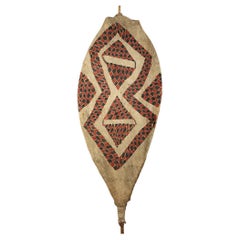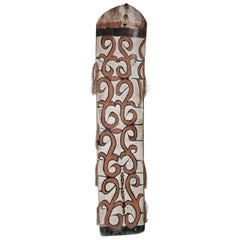Items Similar to Monumental Oceanic Asmat People Carved Painted Wooden War Shield
Want more images or videos?
Request additional images or videos from the seller
1 of 11
Monumental Oceanic Asmat People Carved Painted Wooden War Shield
$2,300
£1,758.47
€2,025.41
CA$3,223.01
A$3,598.18
CHF 1,885.39
MX$44,045.28
NOK 23,944.51
SEK 22,576.64
DKK 15,115.81
About the Item
A monumental, rare and important Oceanic Papuan Asmat People tribal carved war shield from the first half of the 20th century, collected from the coast of the headhunting tribe in Papua New Guinea, a Provincial Indonesian island in the mid 20th century.
Among the Asmat, war shields are the most powerful symbolic element of a warrior's equipment, and have many layers of meaning. Traditionally, they were functional items used to protect warriors in battle by deflecting an enemy's spears and arrows. The carved and painted images on the surface of the shields were also intended to frighten the enemy and symbolize the power of the ancestors.
Ancestral imagery appears on multiple forms of Asmat art, including wood war shields. Shields were created as functional items for warfare, and were meant to protect the user from the spears and arrows of his enemy. At the same time, the imagery that is carved and painted on the surface of the shield endows the piece with the power of the ancestors, which is also intended to protect the user. The designs can be either figural or abstract, depending on the region from which the shield came.
This impressive sculptural wooden shield features various abstract geometric carvings, often used to represent the warriors (shield owner) ancestor's name, as well as symbolic references to them, which the clansmen believe give the ancestor, and in effect the warrior, strength, speed, agility, knowledge and other ancestral and spiritual powers during the frequent times of warfare or headhunting raids. The backside has a substantial sized handle, allowing the warrior to use two hands to better hold and control the shield. The Asmat's war shields are hand carved and polychrome painted using only primitive tools and color pigments found around their village. The red pigment obtained from ochre, white pigment from crushed limestone, which is used to lighten the wood and black from black soot or a burnt piece of wood.
DIMENSIONS: (approx):
68.5" High, 23.75" Wide, 4" Deep
Provenance / Acquisition:
Acquired from the highly reputable auction house Austin Auction Gallery, est.1983, Austin, Texas
Brief Asmant history:
From Dirk Smidt, Asmat Art, New York: Braziller, 1993. Smidt says: 'In a culture where death was never accidental and all required avenging in a continuous cycle of warfare, shields served a practical purpose of protection but also the symbols carved on the shields radiated power, invigorating the shields owner and striking fear into the enemy. The shields are named after dead relatives. The magical powers of the shield gave the carrier exceptional power combining his strength with that of the deceased ancestor to which the shield shared the name. The shields were used not just in battle but to scare off evil spirits that may have brought misfortune to the village. These shields were made for a shield feast which initiated a headhunting expedition.
Because of their symbolic and emotional value shields were precious and in the North Western Asmat region passed down from father to son. The designs on the shields are highly stylized and now sought-after as one-of-a-kind tribal folk art work.
Located in southwestern New Guinea, the Asmat live along the coast where a vast system of rivers flow into the Arafura Sea. With an estimated population of 70,000, the Asmat are divided into several hundred villages ranging in size from 35 to 2,000 inhabitants.
Headhunting raids were an important element of Asmat culture until missionaries suppressed the practice, which, according to some accounts, persisted into the 1990s. The death of an adult, even by disease, was believed to be caused by an enemy, and relatives sought to take a head in an endless cycle of revenge and propitiation of ancestors. Heads were thought necessary for the rituals in which boys were initiated into manhood. Cannibalism was a subsidiary feature of the rituals that followed the taking of heads
Wood carving is a flourishing tradition among the Asmat, and wood carvers are held in high esteem. The culture hero Fumeripits is considered to be the very first wood carver, and all subsequent wood carvers (known as wowipits) have an obligation to continue his work. The Asmat also believe that there is a close relationship between humans and trees, and recognize wood as the source of life.
CONDITION:
The war shield is in great condition, with nicely aged faded polychrome and warm patina over the whole. Strong, sturdy, stable, structurally sound tructurally sound. Wear consistent with age/use adds to the character and charm!
Interesting, decorative and a bit unusual, makes for wonderful sculptural object and conversation piece! A quick way to add sophisticated antique character, decorative color, texture and rustic warmth, historical depth, and rich cultural interest to any space.
Easy to display, stand as a large sculpture leaning against a wall or in a corner, or a later metal loop is securely attached to the handle for wall hanging.
- Dimensions:Height: 68.5 in (173.99 cm)Width: 23.75 in (60.33 cm)Depth: 4 in (10.16 cm)
- Style:Tribal (Of the Period)
- Materials and Techniques:
- Place of Origin:
- Period:
- Date of Manufacture:circa 1925
- Condition:Wear consistent with age and use. Minor losses. Minor fading. The war shield is in great condition, with nicely aged faded polychrome and warm patina over the whole. Strong, sturdy, stable, structurally sound tructurally sound. Wear consistent with age/use adds to the character and charm.
- Seller Location:Forney, TX
- Reference Number:1stDibs: LU5977240248952
About the Seller
4.8
Platinum Seller
Premium sellers with a 4.7+ rating and 24-hour response times
Established in 2013
1stDibs seller since 2021
294 sales on 1stDibs
Typical response time: <1 hour
- ShippingRetrieving quote...Shipping from: Forney, TX
- Return Policy
Authenticity Guarantee
In the unlikely event there’s an issue with an item’s authenticity, contact us within 1 year for a full refund. DetailsMoney-Back Guarantee
If your item is not as described, is damaged in transit, or does not arrive, contact us within 7 days for a full refund. Details24-Hour Cancellation
You have a 24-hour grace period in which to reconsider your purchase, with no questions asked.Vetted Professional Sellers
Our world-class sellers must adhere to strict standards for service and quality, maintaining the integrity of our listings.Price-Match Guarantee
If you find that a seller listed the same item for a lower price elsewhere, we’ll match it.Trusted Global Delivery
Our best-in-class carrier network provides specialized shipping options worldwide, including custom delivery.More From This Seller
View AllImportant Oceanic Carved Asmat Tribal Sago Bowl Serving Platter after War Shield
Located in Forney, TX
A rare and important Oceanic Papuan Asmat tribal carved ancestral sago bowl (also known as a platter, serving shield and tray) crafted in the likes of the...
Category
20th Century Papua New Guinean Tribal Tribal Art
Materials
Wood, Paint
Antique Native American Indigenous Peoples Carved Polychrome Canoe Model
Located in Forney, TX
An exceptionally rare antique Native American / Indigenous Peoples hand carved and painted wooden dugout canoe model, dating to the early 20th century or earlier, likely Pacific Nort...
Category
Early 20th Century North American Native American Sculptures and Carvings
Materials
Twine, Wood, Paint
Large Oceanic Gope Carved Wooden Ancestor Spirit Board
Located in Forney, TX
An Oceanic "Gope" Papuan ancestral spirit board, 20th century, collected from the Gulf Province, Papua, New Guinea, Kerewa or Hohao village tribe.
Hand...
Category
20th Century Papua New Guinean Folk Art Sculptures and Carvings
Materials
Metal
18th Century Swedish Carved Mangle Board
Located in Forney, TX
A long hand carved wooden mangle board (clothing and bedding press) with beautiful patina.
Handmade in Sweden, circa 1744, this Scandinavian antique with...
Category
Antique 18th Century Swedish Primitive Sculptures and Carvings
Materials
Wood
Antique African Tribal Carved Bone TOTEM Ceremonial Pipe
Located in Forney, TX
An unusual and whimsical figural TOTEM carved bone ceremonial pipe, displayed raised on a custom wooden Stand.
Outstanding patina. Superb condition.
Dimensions: (approx)
Pipe...
Category
Early 20th Century Tribal Tribal Art
Materials
Bone, Wood
Antique Congolese African Tribal Carved Hemba Helmet Mask, Suku Peoples
Located in Forney, TX
A scarce antique African tribal carved Hemba helmet mask, the Suku peoples, possibly Kwese culture, Democratic Republic of the Congo, Central Africa, early 20th century, surmounted by four-legged animal, over round face, with mouth ajar and incised jagged teeth exposed, protruding almond shaped eyes, scattered remnants of pigment, full raffia fiber fringe, mounted on wood stand.
A superb museum quality example, this remarkable tribal folk art sculpture is a wonderful way to add rustic warmth, rich historical depth, and fascinating cultural interest to any space!
Dimensions: (approx)
Overall: 26" High, 9" Wide, 10.25" Deep;
Mask only: 15" Tall;
7 lbs total
Provenance / Acquisition:
Acquired from the highly reputable auction house, Austin Auction Gallery, est.1983, Austin, Texas.
Excellent Condition:
Nicely aged distressed patina over the whole. Highly desirable wear consistent with age and indicative of use, including scattered losses, antique character marks and typical signs of aging throughout. Retaining scattered remnants of original pigment. Overall a superb museum quality example
Primitive Arts Of Africa:
Among the Suku of the southwestern part of the Democratic Republic of the Congo, masks plays crucial role in protecting boys during initiation, the vulnerable period between boyhood and manhood. The power contained in Hemba masks...
Category
Early 20th Century Congolese Tribal Tribal Art
Materials
Raffia, Wood
You May Also Like
Oceanic Vintage Shield, Tribal Wall Art, Papua New Guinea, Late 19th Century
Located in Odense, DK
A large decorative and rare hand carved tribal war shield in traditional colors, made in Papua New Guinea in the late 19th century. Functional as beautiful ...
Category
Antique Late 19th Century Papua New Guinean Primitive Decorative Art
Materials
Wood, Paint
New Guinea Asmat Large Serving Platter with Ancestor Head on top
Located in Point Richmond, CA
New Guinea, Indonesia from the Asmat people a large serving platter with ancestor head on top, crested with bird head. Scooped out inside with coating of white pigments. Outside wi...
Category
Mid-20th Century Indonesian Tribal Tribal Art
Materials
Wood
$960 Sale Price
20% Off
Antique Tapa Tribal Dance Shield, New Guinea
Located in Point Richmond, CA
Tapa dance shield.
Baining People, New Britain, Papua New Guinea.
First half, 20th century
Pounded mulberry bark painted with natural pigments
Measure...
Category
Early 20th Century Papua New Guinean Tribal Tribal Art
Materials
Bamboo, Natural Fiber
Early 20th Century Large Tribal Shield
Located in Sheffield, MA
Highly decorative and impressive shields from the buttress-like roots and/or trunks of mangrove trees. The soft mangrove wood is well suited to be proces...
Category
Early 20th Century Unknown Tribal Masks
Materials
Wood
$1,500 Sale Price
45% Off
Carved Wood Aboriginal Shield, Western Australia
Located in Atlanta, GA
A tall and narrow parrying shield from the Aboriginal people living in the Western Australia. The piece was carved out of a single block of hard wood t...
Category
Early 20th Century Australian Tribal Tribal Art
Materials
Wood
Papua New Guinea Carved-Wood Lumi Shield on Custom Iron Stand
Located in Atlanta, GA
A Papua New Guinea carved-wood Lumi shield from the mid-20th century. This vintage war shield from the West Sepik region, the northwestern most province of...
Category
Mid-20th Century Papua New Guinean Sculptures and Carvings
Materials
Iron
More Ways To Browse
Antique Shields
Antique Wooden House
Carved Shield
Folk Art Tree
Wood Shield
Tribal Wall Hanging
Carved Wood Shield
Folk Art Texas
Wooden Carved Trees
Tree Of Life Folk Art
Southwestern Wall Art
Antique Black Limestone
Tree Of Life Wall Hanging
Antique Furniture Austin
Southwestern Decorative Objects
Antique Indonesian Wood Carvings
Antique Dirk
Carved Ancestor Figure
